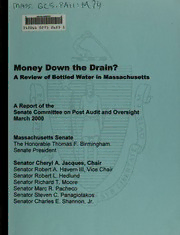
Money down the drain : a review of bottled water in Massachusetts : a report of the Senate Committee on Post Audit and Oversight PDF
Preview Money down the drain : a review of bottled water in Massachusetts : a report of the Senate Committee on Post Audit and Oversight
Gc^>.?AU--K? l Onpi?f. j UMASS/AMHERST 312Dbb 0271 2bE3 S Money Down the Drain? A Review of Bottled Water in Massachusetts A Report of the Senate Committee on Post Audit and Oversight March 2000 Massachusetts Senate The Honorable Thomas Birmingham F. Senate President Senator Cheryl A. Jacques, Chair Senator Robert A. Havern Vice Chair III, Senator Robert Hedlund L. Senator Richard T. Moore Senator Marc R. Pacheco Senator Steven C. Panagiotakos Senator Charles E. Shannon, Jr. " "When you drink the water, remember the spring. -Chinese Proverb Senate Committee on Post Audit and Oversight Senator Cheryl A. Jacques, Chair The Senate Committee on Post Audit and Oversight works to ensure that state government is accountable to the citizens of the Commonwealth. The Committee's charge is to monitor compliance with state laws, to act as a watchdog to protect taxpayers from waste and fraud, to evaluate the efficiency and effectiveness of state agencies and programs, and to recommend corrective actions through legislation, regulation, and administrative initiatives. Senate Post Audit and Oversight Bureau Joel Andres Barrera Director Victoria Grafflin Deputy Director and Editor Angus G. McQuilken Chief of Staff, Senator Cheryl A. Jacques Carolyn Ringel Legal Counsel, Senator Cheryl A. Jacques Tobi Quinto Analyst and Principal Writer and Researcher The Bureau acknowledges the work of Rosalind Kabrhel, Rita Noonan, Aaron Spira, Kavitha Muthuswamy, Amanda Hart, Regina Hill, Ehren Brav, Jeff Austin, and Julia Sechen. In addition, the Bureau recognizes contributions made to this report by interns who volunteered their time in the summer of 1999, including: Christopher Adams, Justin Anderson, David Bae, Kristen Canavan, Elizabeth Frieze, David Fusaro, Colleen Harkins, Elizabeth Kaplan, Stephen Kerr, Brian Mcintosh, and Eve Wilder. The Bureau would also like to acknowledge the assistance of the Massachusetts Department of Public Health, the Massachusetts Department of Environmental Protection, the Massachusetts Association of Health Boards, the Massachusetts Health Officers Association, Boston University School of Public Health, Northeastern University, Tufts University Schools of Medicine and Public Health, the International Bottled Water Association, and the many public health officials, academic researchers, and representatives from the industry who offered their expertise on the subject of bottled water. Table of Contents Summary Executive I. Background II. Problems with Bottled Water Oversight Consumption Up, Oversight Down 1. Enforcement Drought 2. 3. Overlapping Oversight, Out-of-Date Permit Fees IV. National Perspective 19 V. Findings and Recommendations 21 SUMMARY EXECUTIVE Despite skyrocketing consumption of bottled water, Massachusetts' oversight of the bottled water industry has languished. Bottled water is seemingly everywhere: at the office, at the gym, and in more than one- third of Massachusetts homes. In 1998, U.S. sales of bottled water reached $4.3 billion. Bottled water has become commonplace in many American diets and is the fastest growing segment of the beverage industry. Consumption of bottled water is increasing for a variety of reasons, including taste, convenience, and sometimes necessity. For these and other reasons, consumers pay anywhere from 240 to more than 10,000 times more per gallon for bottled water than they typically do for tap water. For example, a consumer in Ayer, MA who pays 22 cents for a one-year supply of drinking water from the tap could pay approximately $1 ,168.00 for the same amount of a top-selling brand of treated bottled water. Bottled water is sometimes the "water of last resort." During natural disasters such as Hurricane Floyd, or when public drinking water supplies become contaminated, bottled water becomes a necessity, not just a preference. During the summer of 1 999 several Massachusetts towns including Sterling, Ware, and Westford suffered contamination of their public drinking water supplies, forcing residents to either boil their tap water or use bottled water. Furthermore, populations such as the very young and old and those with special health concerns are often urged by health professionals to consume bottled water. Although bottled water is vulnerable to the same safety concerns as tap water, the public perceives bottled water to be safer, healthier, and more pure than tap water. However, in Massachusetts, consumers have no guarantee that bottled water is in fact any safer or purer than tap water. Given that consumers pay a hefty premium for bottled water, Massachusetts has a responsibility to make sure that bottled water is safe for consumption and that consumers know what they are getting. - i -
